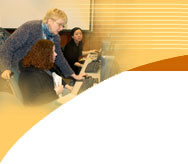

and ADA Guidelines
Buffalo State College is committed to meeting the ADA guidelines for access in the use of electronic media, including online courses, web sites, Blackboard classes, and distance learning. ADA Guidelines - www.section508.gov or ADA Section 508 Guidelines The FAST Center Blackboard and Access Adaptive Equipment &
Assistive Technology on campus
In the years to come, new technology will be available for students and faculty use. We already have talking scanners that can make copies of text materials, voice-input and voice-output computer software, and devices that enlarge print, show work in 3 dimensions and in color-format changes to help students with processing disorders and vision impairments. High speed scanners can be used to make a vocal reproduction of a text if a student needs a book on tape or on CD or in e-text and it is not available any other way. Project EASI at RIT, and the CAST Center at Harvard Project EASI – Easy Access for Students and Institutions – is one of the first training programs designed to improve access for individuals who are blind or visually impaired as they retrieve information from print format and online. The founders, Norman Coombs and Richard Banks, are both visually-impaired and have trained thousands of faculty, students, computer systems staff and software authors, and disability support staff on the use of assistive technology. Dr. Coombs is a professor emeritus from RIT, and their site is still maintained there, but he now lives and works in California. The CAST Center – The Center for Applied Special Technology – was founded in 1984 at Harvard, with the intent to provide assistive technology to individuals with disabilities who needed adaptations in their learning environments and in their daily living experiences. In 1994, a paradigm shift was made to the theory of Universal Design – an architectural term that referred to curb cuts, lever-style handles on doors and faucets, etc. that could be used by anyone, with or without a disability. Using that concept in education at the college/university level takes some planning, and for nearly 10 years, CAST has been in the business of Universal Design. CAST has been part of many federal government research initiatives and its research base and board of directors provide a wealth of information for those willing to research or special projects on designing courses for college students with disabilities as model courses. This is the organization that also brought us the “Bobby-approved” symbol of accessible online web sites. |
Eligibility
for Students | Referral
of a Student | Syllabus
Statements | Guidelines
for Faculty
Web
Construction and ADA Guidelines | Extension
Policies | Language
of Disability
Reasonable
Accommodations by Disability | Project
Success Workshops
Eligibility for Services | Prospective Students | Current Students | Faculty and Staff
Policy on Disability | Resources | FAQ's | Glossary